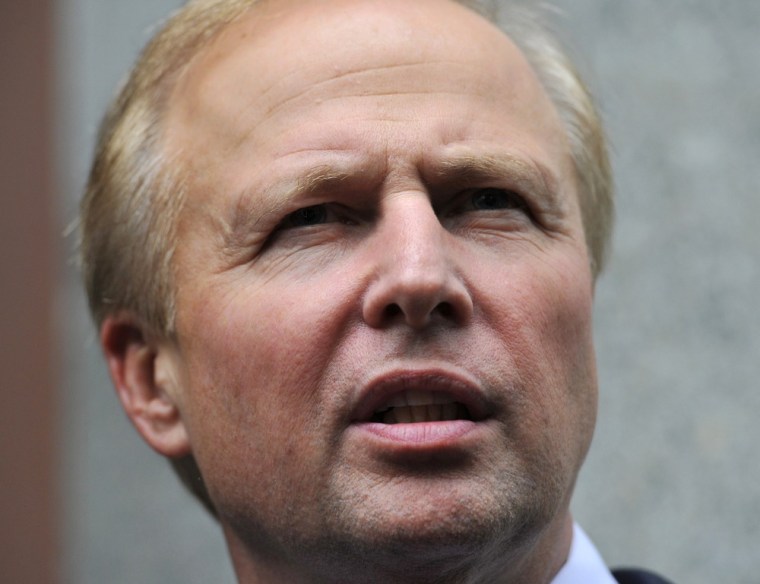The American picked to lead oil giant BP as it struggles to restore its finances and oil spill-stained reputation pledged Tuesday that his company will remain committed to the Gulf region even after the busted well is sealed.
Robert Dudley will become BP PLC's first ever non-British chief executive, the company said as it reported a record quarterly $17 billion loss and set aside $32.2 billion to cover costs from the spill.
Ending weeks of speculation, BP confirmed that gaffe-prone Tony Hayward will step down Oct. 1 as the London-based company seeks to reassure both the public and investors that it is learning lessons from the spill.
"There's no question we are going to learn things from this investigation of the incident," Dudley told reporters by phone from London after the announcement was made.
BP Chairman Carl-Henric Svanberg echoed that during a webcast presentation on the company's earnings, telling investors that BP will change as a result of the April 20 oil rig explosion that killed 11 workers and set off the worst offshore spill in U.S. history.
"We are taking a hard look at ourselves, what we do and how we do it," he said. "What we learn will have implications for our ways of working, our strategy and our governance."
Svanberg said the company's priority was to stop the Gulf leak permanently and then to clean up miles of spoiled waters and beaches and compensate people whose livelihoods have been lost because of the accident.
But he added that the company was determined to restore value to shareholders, after a 35 percent, or $60 billion, drop in market value to around $116 billion since the explosion. Under U.S. political pressure, the company also axed dividends to shareholders this year.
The stock started out marginally higher on Tuesday, but dropped 3 percent to 404.2 pence in afternoon trade on the London Stock Exchange.
In New York, BP stock slumped about 2 percent to $37.87 after BP announced it would sell $30 billion in assets to help pay potential costs related to the spill.
Analysts said they were disappointed at how many assets BP was willing to sell, and its cost estimate was thought to be on the conservative side.
BP made its estimate on the assumption that it won't be deemed "grossly negligent" in its handling of the well. If it is, then BP won't be able to ask its partners to help pay for the cleanup, and federal fines will go up.
"The penalties are obviously going to be more than what they're saying," Oppenheimer & Co. analyst Fadel Gheit said.
Dudley, BP's managing director, was brought in to oversee the spill response after Hayward was vilified for a series of ill-timed moves, including saying that he would like his life back and attending a yacht race off the coast of England as Gulf residents struggled to cope with the spill.
Dudley spent some of his childhood in Mississippi and worked for 20 years at Amoco Corp., which merged with BP in 1998. He lost out to Hayward on the CEO slot three years ago.
"I don't particularly like talking about myself, but I think you will find I listen hard and carefully to people and have worked with restructuring organizations to achieve change," he said. "I did not seek out this job. I was asked to step into these shoes, and I firmly and deeply believe that BP is a company made up of great people and great businesses."
Dudley will be based in London and will hand over spill response coordination to Lamar McKay, the chairman and president of BP America.
He also downplayed speculation that BP might pull back from the Gulf once the flow of oil is stopped permanently, which could happen as soon as mid-August.
"There's no one thinking that way," he said.
BP kicked off the revamp by announcing the sale of $30 billion in assets to streamline the company into a leaner, higher-quality business.
The company has already made a start with the $7 billion sale of gas assets in the United States, Canada and Egypt to Apache Corp.
Svanberg said the planned asset sales did not necessarily reflect a fear that spill costs could soar above the $32.2 billion set aside by the company. That charge includes the $20 billion compensation fund the company set up following pressure from President Barack Obama as well as costs to date of $2.9 billion.
Hayward, who will stay on BP's board until Nov. 30, said the company had reached a "significant milestone" with the temporary capping of the leaking well, which stopped oil from spewing nearly two weeks ago. Before that, anywhere from 94 million to 184 million gallons had gushed into the Gulf.
In a mark of faith in its outgoing leader, the company said it planned to recommend him for a non-executive board position at its Russian joint venture, TNK-BP.
Hayward remains well-regarded in Europe and his appointment would be a benefit for Dudley, who, as the former head of TNK-BP, was forced to flee Russia and run the company in absentia after a flap with shareholders in 2008.
Hayward will receive a year's salary of 1.045 million pounds ($1.6 million) as part of his severance package. He will also be entitled to draw an annual pension of 600,000 pounds from a pension pot valued at around 11 million pounds and retains his rights to shares under a long-term performance program which could eventually be worth several million pounds if BP's share price recovers.
Hayward said it was right that BP embark on its next phase under new leadership, and expressed his condolences for the families of the workers killed in the explosion.
"The Gulf of Mexico explosion was a terrible tragedy for which — as the man in charge of BP when it happened — I will always feel a deep responsibility, regardless of where blame is ultimately found to lie," he said.
